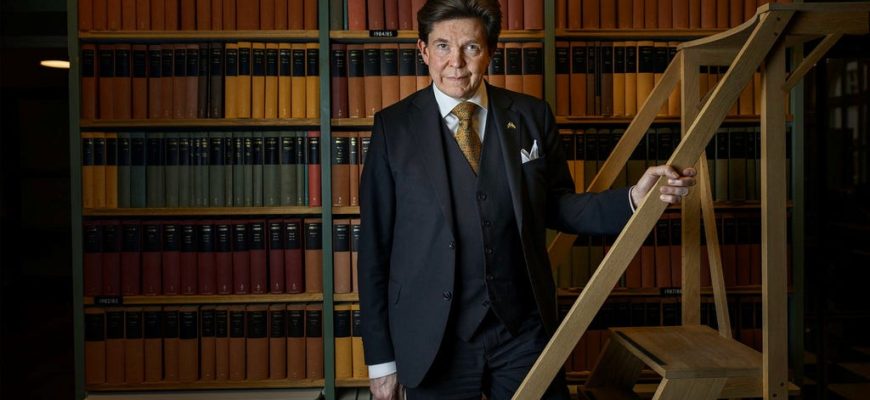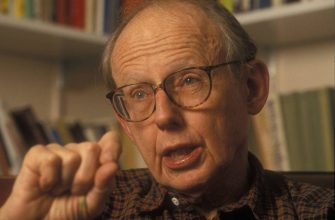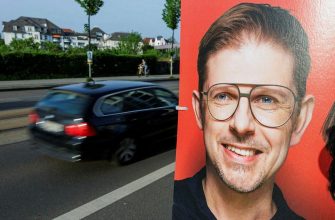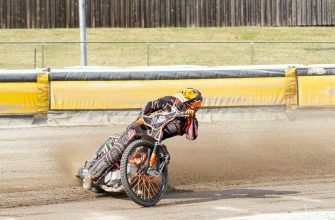It is no understatement to say that poetry brought them together.
Andreas Norlén and Helena Kjellström, as she was called at the time, met on a dating site. For six months, they wrote to each other. The first meeting in the world of the senses took place in the Småland railway metropolis of Nässjö, midway between their then respective hometowns of Motala and Malmö.
He had with him a copy of the anthology “Svensk dikt†compiled by Lars Gustafsson. Hon Shakespeare’s drama “Julius Caesar†.
They exchanged gifts and went for a bite to eat at a restaurant recommended by a fellow party member, the best thing on the menu was plank steak with powdered mash. In the square outside, an anti-racist rally was going on and the bar at Hotel Högland, where they hoped to have a drink afterwards in peace and quiet, was partially booked for a high school disco.
– It was an evening filled with complications and an odd atmosphere, which ended in the wee hours with us reading poems to each other in the hotel room, says Andreas Norlé n.
Photo: Moa Källström
Flanked by a Säpovakt he has walked from the office on Helgeandsholmen to the Riksdagsbiblioteket on Storkyrkobrinken in Old Town. After the interview, he will return to the Riksdag house and the same evening host the Speaker’s annual spring dinner, where ministers, members of the Riksdag, authority representatives, researchers, journalists and the court have been invited to to celebrate this year, not only the arrival of spring, but also 50 years of the form of government, the constitution that specifies how the country should be governed.
But he has come to the Riksdagsbiblioteket in the role of author and now he sits in a small room inside the magnificent reading room and tells about his and his wife’s first date. I say it sounds like a scene from an anachronistic chivalric novel.
– Exactly! We found each other because we both love language, literature and reading in the broadest possible sense.
Did you share a taste?
– Yes, I would like to say that. We quickly found some shared favorites by Karin Boye and Edith Södergran. I also think I managed to read a couple of poems by Verner von Heidenstam which I discovered early on.
All three – Boye, Södergran and Heidenstam – are included in the recently published book – The Speaker’s Guide to Swedish Poetry – in which Andreas Norlén himself selected 110 poems from the history of Swedish poetry.
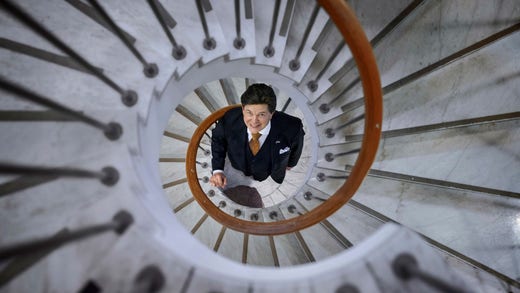
Photo: Moa Källström
The emphasis is on Older poetry, in bound verse and narrative poetry from the 19th and early 20th centuries. But even now active authors such as Stig Larsson, Eva-Stina Byggmästar and Malte Persson are represented.
In the essayistic preface, Andreas Norlén describes the special but pleasant evening in Nässjö, he writes about how he uses poetry in his work as speaker and about how it came about that he at all became a poetry reader.
Actually, it started with an interest in history. Growing up as an only child in the Ostrogothic Ä–deshög, he read more than willingly accounts of the lives and careers of older kings, diplomatic schisms and military triumphs and defeats. At a flea market, he stumbled across a copy of “Reading book for primary school†. The high school student Andreas Norlén bought the book, the first edition of which came out as early as 1868, and read with great commitment, in particular, Snoilsky’s historical poem “Capricorn’s Courier†, which is about the courier’s overwhelming encounter with the dowager queen Hedvig Eleonora after the battle of Helsingborg in 1710, and the poem about the dutiful soldier Sven Dufva from Runeberg’s “Fänrik StÃ¥ls sägner†.
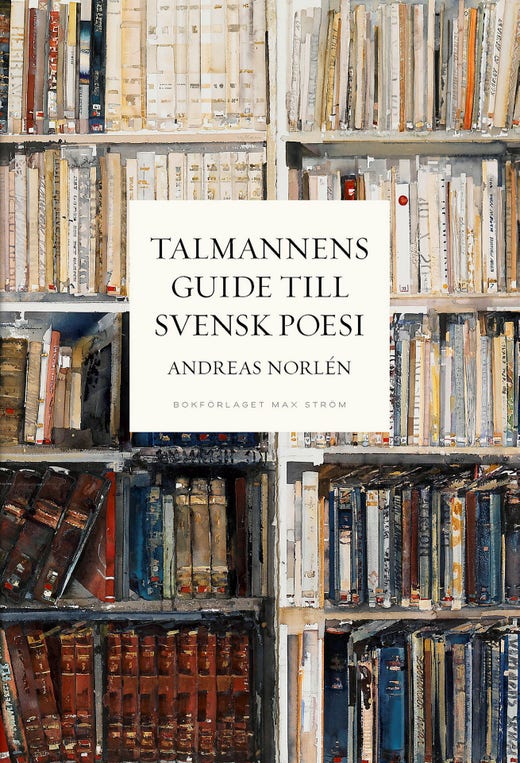
– It is Runeberg’s story about the Finnish war, which as far as Sweden was concerned ended in disaster. In the poem, Runeberg gives his picture of heroes and villains in the scene, he mocks Gustav IV Adolf and pays tribute to others, Sven Dufva for example. Thus, it is also a work with political purposes. But what I got hooked on was the lyrical way of retelling history. I found it exciting and happened to learn some of the poems from the Reading Book by heart.
I tend to think that poems are like bouillon cubes. They add sourness, saltiness and flavor.
He has repeatedly demonstrated this rote knowledge.
During a visit to Finland, with the then Finnish Speaker Paula Risikko, in 2019 a reporter from the Hufvudstadsbladet asked in passing if Norlén could quote something from the work of the Finnish-Swedish national poet Runeberg. Norlén responded by declaiming the 28 verses of “Sven Dufva†. He read at a reasonably fast pace and was done in about seven minutes.
He doesn’t usually last that long. In speeches that he gives in the Riksdag or to start ceremonies of various kinds, he certainly quotes poems as a rule, but usually short ones or a few verses.
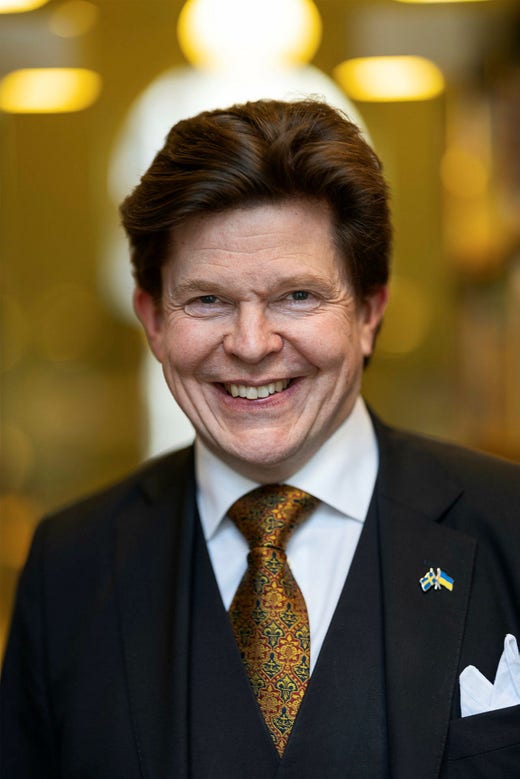
Photo: Moa Källström
– Helena has expressed it like poems are like bouillon cubes and I agree. They add mustiness, saltiness and flavor in concentrate. I simply think they raise and thicken a quote.
Is there poetry you don’t like?
– Yes, I think the reason why Runeberg’s and Boye’s poems spoke so directly to me early on is that they have a form and a language that is immediately accessible, and that there often there is something resembling a story, albeit with several bottoms. I have a harder time with poetry that is abstract, more formless, that does not consist of comprehensible sentences. But then I am also just a simple doctor of law who has never studied literature. I really hope that no one takes the anthology as a pretext to have homework discussions with me about lyric analysis or literary theory.
Twenty years ago Andreas Norlén defended his dissertation with a thesis on unfair contracts where, among other things, he adopted a moral ethical perspective unusual for business law.
Matters of higher education, reading and training have rarely been debated as intensively and widely as during the current mandate. The sitting bourgeois government must belong to the more well-educated of the last decades, but the climate action plan, the drastically reduced budget for student unions and the Minister of Education’s intention to reduce the number of independent university and college courses have caused critics to call it hostile to both science and education.
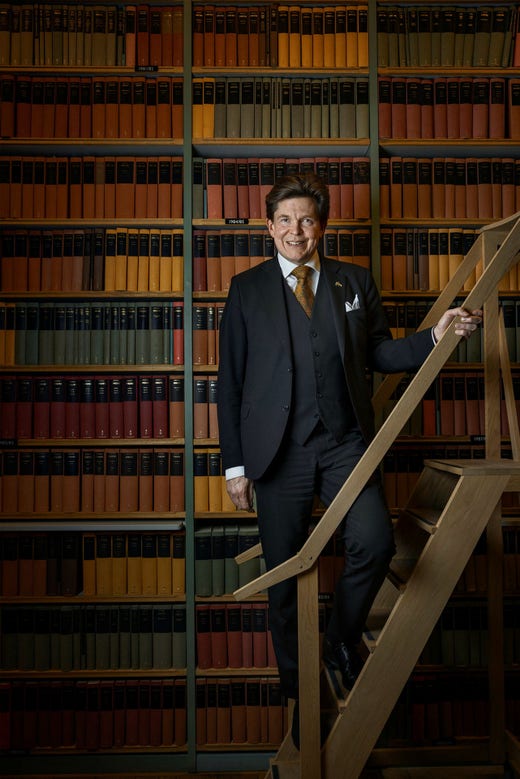
Photo: Moa Källström
Until 2018, Andreas Norlén was a moderate Member of Parliament and chairman of the Constitution Committee. As Speaker, he is politically neutral with the task of representing and leading the work in the Riksdag. When asked if he has followed the current canon debate with newspaper articles by both the Swedish Academy’s permanent secretary Mats Malm and culture minister Parisa Liljestrand (M), he nods enthusiastically and adds gger quickly he should refrain from getting involved in “party-politically charged issues†.
– But as Speaker, I have taken several initiatives to underline the importance of science, research and education for political decision-making. For example, I have introduced the Riksdag’s research day where the committees invite and ask questions to researchers about current topics and which ends with a joint seminar.
So how is it with the members of parliament’s education, is it accurate?
– After all, the Riksdag consists of 349 different individuals, with different experiences and different backgrounds, each one elected by the people. I have great respect for members of the Riksdag and take care to review them.
What role does reading fiction play in the concept of education?
– Reading above all fiction, but to some extent also non-fiction, means that you enter someone else’s universe and assume someone else’s perspective. It is enriching and developing. I think that in politics, and in life in general, it is central to be able to see things from the point of view of others, to try to understand other people’s experiences and experiences in order to try to understand ¥ their opinions and values. Fiction is a way there.
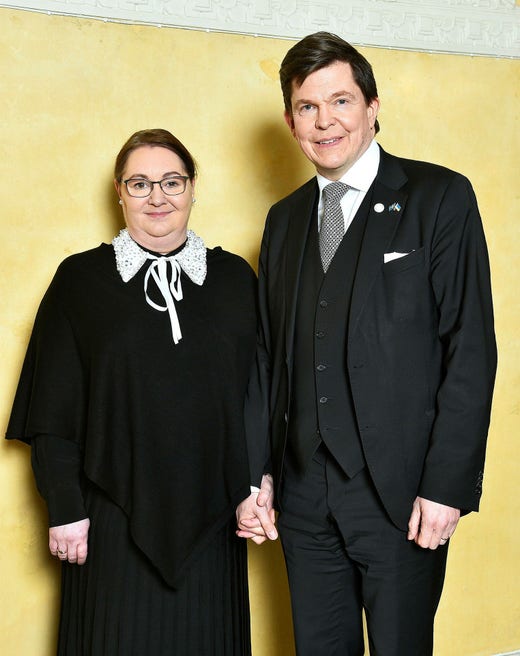
Photo: Karin Törnblom/TT
On his own bedside table at home in the villa in Norrköping, the book stack is quite high for the occasion. There is an autobiography by John Bercow, former Speaker of the British Parliament, “The third man†, which is about the Prime Minister of Canada during the Second World War, and the collected works of Gustaf Frøding. Unfortunately, the time for reading other than agendas and memos has been very limited lately. It doesn’t just depend on the office.
– Since our son Henry was born in 2016, there has been less time for poems. But both Helena and I read a lot to him.
From the selection in the anthology and what you tell about your life, I get the impression that you are a romantic, is that correct?
– Ha ha. Well, I guess I’m a romantic. In any case, my wife and I strive to keep our conversations alive and to spice up everyday life with community and romance.
Facts.Andreas Norlén
Born in 1973, raised in Ödeshögi Östergötland. Joined the Moderata ungdomsförbundet in 1988 and received a doctorate in business law in 2004. Two years later he was elected to the Riksdag and was chairman of the constitution committee between 2014 and 2018 when he succeeded Urban Ahlin as Speaker of the Riksdag . After the election that same year, he had a leading role in the protracted government formation, and through his press conferences, his patience and the candy bars he treated the party leaders with a touch of popular affection.
He lives in Norrköping with his wife Helena Norlén and son Henry.
Current with the dictation anthology †The Speaker’s guide to Swedish poetry†(Bokförlaget Max Ström).
Read more lyrics by Sandra Stiskalo
